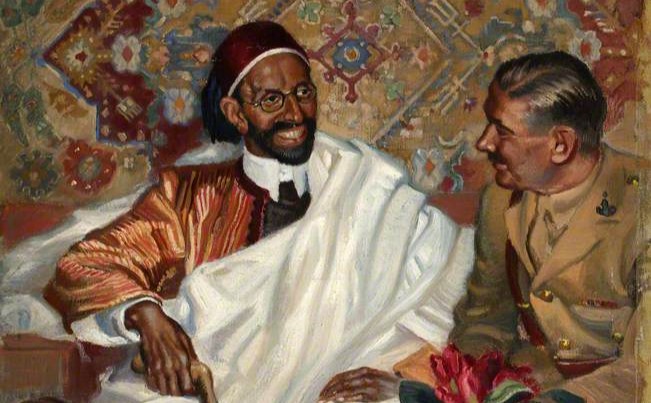The first and only king Gaddafi overthrew: Who is Idris es-Senusî?
The Free Officers Movement led by Muammar Gaddafi overthrew King Idris (Idris of Libya) on 1 September 1969 and took control of Libya. So how did a person who was actually a cult leader become king? Here is his story:

Muhammad Idris es-Senusi, the first and only king of the Kingdom of Libya, who always had a naive and polite character, became the head of the Sanusi order in 1917. Idris es-Senusi, who aimed to solve the confusion in Libya by agreement instead of war, turned to the Italians to make an agreement. The agreement that Idris es-Senusi reached with the Italians on the condition that the Senusi withdraws from the armed struggle was in vain as one of the Sheikhs of the Sanusi lodge, Ömer Muhtar, did not give up the armed resistance. Thereupon, İdris es-Senusi, who left his brother Muhammed Rıza as his deputy, went to Egypt. Although the armed resistance in Libya ended, Senusi, who sought ways to recapture Libya through political means, established the Kingdom of Libya in 1949 and declared himself the King of Libya in 1950. The Ottoman-Senusi relations, which developed during the struggle against the Italians, continued positively between Libya and Turkey after that day. In addition to these, İdris es-Senûsî made his first official abroad visit Turkey in 1956. Muhammad Idris es-Senusi was deposed in a bloodless coup in 1969 by a young officer, Muammar Gaddafi.
Muhammad Idris bin Muhammad al-Mahdi as-Senussi (Arabic: إدريس, romanized: Idrīs; 13 March 1890 – 25 May 1983)[1] was a Libyan political and religious leader who was King of Libya from 24 December 1951 until his overthrow on 1 September 1969.
Muhammad Idris es-Senusi, the first and only king of the Kingdom of Libya, was born in Jagbub, Libya in 1890, to his grandfather Sheikh Mohammed b. He was born in the central hermitage founded by Ali es-Senusi. Idris es-Senusi spent his childhood in this lodge, receiving education from the Senusi sheiks.
Idris es-Senusi, whose childhood coincided with the time when he was busy with the preaching activities of the Senusi sect, also faced the cold side of the war in his youth years. İdris es-Senûsî, who has always had a naive and polite character, was never actually on the battlefield, although he made agreements and negotiations with Ottoman officers such as Enver Pasha and Mustafa Kemal who came to the region during this period.
When his father died when he was only 11 years old, his uncle's son, Ahmed Sharif es-Senusi, became the sheik of the sect. This was also a reason why Idris did not directly participate in the war. While the Tripoli War had a negative impact on İdris es Senûsî, members of the Senûsi sect gained success against the Italians.
In 1917, when the sect sheik Ahmed Sharif went to Istanbul to seek help and support, İdris es-Senusi became the deputy head of the sect. However, when Ahmed Sharif es-Senusi decided to stay in Turkey to support the National Struggle, Idris became the head of the sect.
Idris es-Senusi, who could not reach the desired result with the British, turned to the Italians this time. He signed the er-Recime agreement with the Italians in 1920, and the Abu Meryem agreement in 1921, on the condition that the Sanusi withdraw from the armed struggle, and he obtained leadership in the Jagbub region that the Italians deemed legitimate.
However, the conditions of the agreement Idris signed with the Italians could not be fulfilled, as Ömer Muhtar, who is one of the Sheikhs of the Senusi zawiya and was seen as a leader by the people with his stance, struggle and piety, did not give up the armed resistance and the Libyan people supported him in this stance. Thereupon, İdris es-Senusi, who left his brother Muhammed Rıza as his deputy, settled in Egypt in 1922.
After Mussolini seized power in Italy, Italy launched a new invasion of Libya in 1922, and after catching and executing leader Omar Mukhtar in 1931, the Sanusi resistance was broken. The Italians, with the ambition of seizing Libya after years of struggle, closed all of the Sanusi lodges and confiscated the properties of the members. Despite the end of the armed resistance in Libya, Idris al-Sanusi in Egypt was looking for ways to recapture Libya through political means.
After Idris' close relations with the British, the forces consisted of Arab-British forces II. When he fought together on behalf of Britain in World War II, the British supported him in declaring independence in Libya.
The Ottoman-Senusi relations, which reached their peak in the Tripoli War, continued positively between Libya and Turkey.
İdris es-Senusi appointed Sadullah Koloğlu, who had been in the governorships of Hakkari and Bingöl, to the ministries of Interior, Health, and National Education, respectively, in the assembly he established, while Umran Yetişalı was appointed as the army commander, and Abdullah Busayri, who was a press and legal consultant at the Turkish Foreign Ministry, as the Minister of Foreign Affairs.
As the country prospered upon the discovery of oil reserves in Libya, oppositional voices began to rise against Idris es-Senusi. In 1969, King Idris's return to Turkey for an official visit caused him to lose his power. Muhammad Idris, who gained great power with the support of his western allies and tribes in the region, was deposed in a bloodless coup by a young officer, Muammar Gaddafi, in 1969.
Idris es-Senusi, who was well remembered by both personalities, but refrained from fighting because of his delicate nature, passed through Greece first after the coup, with the transfer of Muhammad Esed, who also had the opportunity to meet with Ömer Muhtar and Ahmed Şerif es-Senusi. After residing in Greece for a short time, he moved to Cairo and became an Egyptian citizen, and lived in Egypt until his death in 1983.
